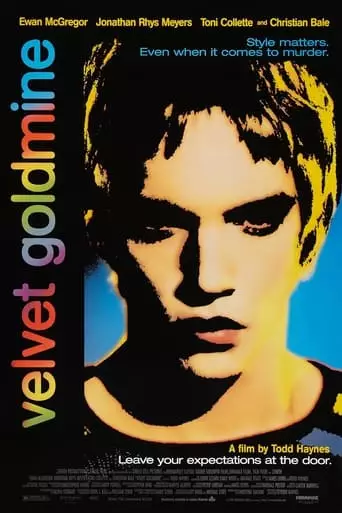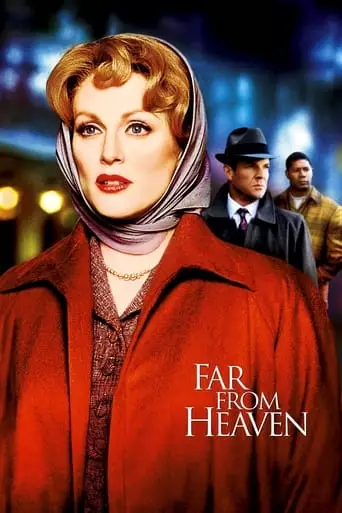The story of a young boy in the Midwest is told simultaneously with a tale about a young girl in New York from fifty years ago as they both seek […]

The story of a young boy in the Midwest is told simultaneously with a tale about a young girl in New York from fifty years ago as they both seek […]

In 1950s New York, a department-store clerk who dreams of a better life falls for an older, married woman. Carol (2015), directed by Todd Haynes, is a poignant romantic drama […]

An upper middle-class housewife suffering from various unexplained symptoms of illness comes to believe that she is suffering from multiple chemical sensitivity and moves into a secluded facility to recover. […]

Six actors portray six personas of music legend Bob Dylan in scenes depicting various stages of his life, chronicling his rise from unknown folksinger to international icon and revealing how […]

Almost a decade has elapsed since glam-rock superstar Brian Slade escaped the spotlight of the London scene. Now, investigative journalist Arthur Stuart is on assignment to uncover the truth behind […]

In 1950s Connecticut, a housewife’s life is upended by a marital crisis and mounting racial tensions in society. Far from Heaven (2002), directed by Todd Haynes, is a poignant homage […]
Todd Haynes: A Visionary of Emotion and Aesthetics
Todd Haynes is a celebrated American filmmaker whose work explores identity, desire, and the human condition through visually striking and emotionally resonant narratives. Known for his bold storytelling and meticulous craftsmanship, Haynes has directed acclaimed films such as Far from Heaven (2002), Carol (2015), and Velvet Goldmine (1998).
A pioneer of New Queer Cinema, Haynes has earned a reputation as a director unafraid to challenge conventions, blending genre, homage, and innovation to create works that resonate deeply with audiences.
Early Life and Artistic Beginnings
Born on January 2, 1961, in Los Angeles, California, Todd Haynes grew up with a passion for art and storytelling. He studied semiotics at Brown University, where he developed a deep appreciation for the interplay of symbols, meaning, and visual aesthetics.
Haynes’ early work reflected his experimental approach to filmmaking. His short film Superstar: The Karen Carpenter Story (1987), which told the tragic story of singer Karen Carpenter using Barbie dolls as actors, gained cult status despite legal challenges that limited its distribution.
Breakthrough: Poison (1991)
Haynes’ feature debut, Poison, was a landmark in New Queer Cinema. The film, inspired by the writings of Jean Genet, weaves together three interrelated stories that explore themes of alienation, desire, and societal repression.
Winner of the Grand Jury Prize at the Sundance Film Festival, Poison established Haynes as a bold and innovative filmmaker with a distinctive voice.
Exploring Identity and Desire
Velvet Goldmine (1998)
A kaleidoscopic exploration of glam rock and its cultural impact, Velvet Goldmine is a tribute to the era of David Bowie, Iggy Pop, and Lou Reed. Starring Jonathan Rhys Meyers, Christian Bale, and Ewan McGregor, the film blends fantasy and history to examine identity, sexuality, and the transformative power of music.
Far from Heaven (2002)
In Far from Heaven, Haynes pays homage to the 1950s melodramas of Douglas Sirk while tackling themes of race, sexuality, and societal constraints. Julianne Moore stars as a suburban housewife whose seemingly perfect life unravels when she discovers her husband’s secret and forms a bond with an African American gardener.
The film earned critical acclaim, including four Academy Award nominations, and solidified Haynes’ reputation as a master of visual storytelling and emotional depth.
Carol (2015)
Based on Patricia Highsmith’s novel The Price of Salt, Carol is a tender and visually sumptuous love story between two women in 1950s New York. Starring Cate Blanchett and Rooney Mara, the film captures the complexities of forbidden love with sensitivity and elegance.
Carol received widespread acclaim, earning six Academy Award nominations and cementing Haynes’ status as one of the most important contemporary filmmakers.
Experimentation and Innovation
I’m Not There (2007)
In I’m Not There, Haynes explores the life and persona of Bob Dylan through six distinct characters, each representing a different facet of the musician’s identity. Featuring performances by Christian Bale, Cate Blanchett, Heath Ledger, and others, the film defies conventional biopic structures and celebrates the enigmatic nature of Dylan’s artistry.
Dark Waters (2019)
A departure from his earlier work, Dark Waters is a legal thriller based on the true story of a corporate lawyer (Mark Ruffalo) who exposes a chemical company’s environmental contamination. The film highlights Haynes’ ability to tackle real-world issues while maintaining his signature attention to detail and character-driven storytelling.
Recurring Themes and Style
Haynes’ films are characterized by:
Visual Elegance: His meticulous attention to color, composition, and costume design creates visually arresting worlds.
Exploration of Identity: Haynes frequently examines the fluidity of identity and the societal forces that shape it.
Homage and Reinvention: From 1950s melodramas to glam rock fantasies, Haynes draws inspiration from cultural touchstones while reimagining them for contemporary audiences.
Impact and Legacy
Todd Haynes’ work has had a profound impact on cinema, particularly in the representation of LGBTQ+ stories. As a leading figure in New Queer Cinema, he has paved the way for greater diversity and complexity in storytelling. His films resonate with audiences for their emotional depth, aesthetic beauty, and willingness to challenge societal norms.
Haynes’ influence extends beyond his films, inspiring a new generation of filmmakers to embrace bold, personal, and unconventional storytelling.
Conclusion
Todd Haynes is a filmmaker who combines intellectual rigor with emotional authenticity, crafting stories that are as visually stunning as they are thought-provoking. Whether exploring the glamour of rock music, the constraints of societal expectations, or the complexities of love, Haynes’ work continues to captivate and inspire, cementing his place as one of the most visionary directors of his time.